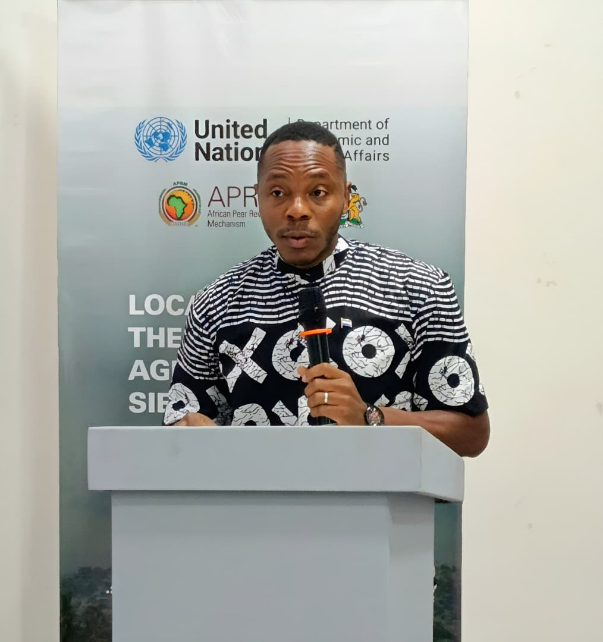The Government of Sierra Leone, in collaboration with the United Nations Department of Economic and Social Affairs (UN DESA), the African Peer Review Mechanism (APRM), and with support from the Government of Italy, has officially opened a high-level Capacity Development Workshop on “Localizing the Sustainable Development Goals (SDGs) and Agenda 2063: Advancing the Principle of Subsidiarity in Practice,”.
Held from 9 to 11 September 2025, the workshop brings together national and local government representatives, development partners, civil society leaders, and international experts to support the integration of global and continental development goals into local governance and service delivery. The workshop forms part of a regional initiative titled “Strengthening Local and National Government Capacities for SDG Localization in Africa,” and is aimed at deepening the institutional capacity of governments to implement the SDGs and Agenda 2063 through practical and localized strategies.
Delivering the keynote address, the Chief Minister of Sierra Leone reaffirmed the government’s commitment to inclusive development under the leadership of His Excellency President Julius Maada Bio. He emphasized that both the 2030 Agenda and Agenda 2063 affirm a shared understanding—that the most meaningful transformation takes place at the local level. According to him, “On behalf of President Bio and the people of Sierra Leone, I welcome you to this important dialogue. The 2030 Agenda and Agenda 2063 both affirm a simple truth—real transformation happens locally. It is in our households, villages, and towns where development is most visible and where impact must be felt.”
He underscored the principle of subsidiarity as a cornerstone of effective governance, calling for responsibilities to be assigned to the lowest effective level to ensure innovation, ownership, and accountability. He highlighted Sierra Leone’s experience with Voluntary Local Reviews (VLRs), noting that municipalities have already begun translating global aspirations into concrete, community-level action. “This workshop is not symbolic it is about aligning our national ambitions with regional goals and translating both into tangible, localized delivery,” he said.
The Chief Minister also reflected on the alignment between this workshop and President Bio’s “Big Five Game Changers,” which prioritize food security, youth employment, infrastructure, technology, and human capital development. He stated that these priorities are deeply linked to both national aspirations and international development frameworks, including the SDGs, Agenda 2063, and ECOWAS Vision 2050. He noted that the government remains committed to its Medium-Term National Development Plan and to delivering results for all Sierra Leoneans, from the most urbanized areas to the most remote and underserved districts.
The session also featured statements from Kenyeh Barlay, Minister of Planning and Economic Development, and Tamba Lamina, Minister of Local Government and Rural Development. Both ministers underscored the importance of multilevel governance and decentralization as essential strategies for sustainable development and social inclusion.
Mr. Frederick Ampiah, UNDP Resident Representative in Sierra Leone, commended the government for its leadership and continued progress in localizing the SDGs. He emphasized the value of empowering local governments and ensuring coherence between national and subnational policies, noting that Sierra Leone’s engagement with the VLR process serves as a model for other countries in the region. “When local actors are empowered and resourced, development becomes inclusive, accountable, and sustainable,” Mr. Ampiah stated.
The workshop aims to strengthen the practical application of the principle of subsidiarity—one of the 11 UN Principles of Effective Governance for Sustainable Development, endorsed by ECOSOC in 2018. Participants are exploring how this principle can inform the allocation of roles and responsibilities across government levels, and how to build stronger institutional and fiscal frameworks to support localized planning and delivery.
Key areas of focus include the use of Voluntary Local Reviews (VLRs) to guide SDG implementation at the municipal level; the alignment of local development plans and budgets with national, regional, and global frameworks; improving municipal finance and intergovernmental transfers; and promoting effective, citizen-centered public service delivery.
Sierra Leone’s participation in this initiative builds on its continued commitment to SDG localization, multilevel governance, and knowledge sharing within continental platforms such as APRM and ECOWAS. With the second ten-year implementation plan of Agenda 2063 now underway, and the global community entering the final stretch toward the 2030 Agenda, the workshop underscores Sierra Leone’s leadership and readiness to deliver on all fronts.
In closing, the Chief Minister called for a shared sense of responsibility and urgency. “We remain fully committed to delivering for our people not only on our six-year medium-term plan, but on the SDGs, ECOWAS Vision 2050, and Agenda 2063. Development is not linear, but through equity, innovation, and subsidiarity, we will accelerate progress for all.”




